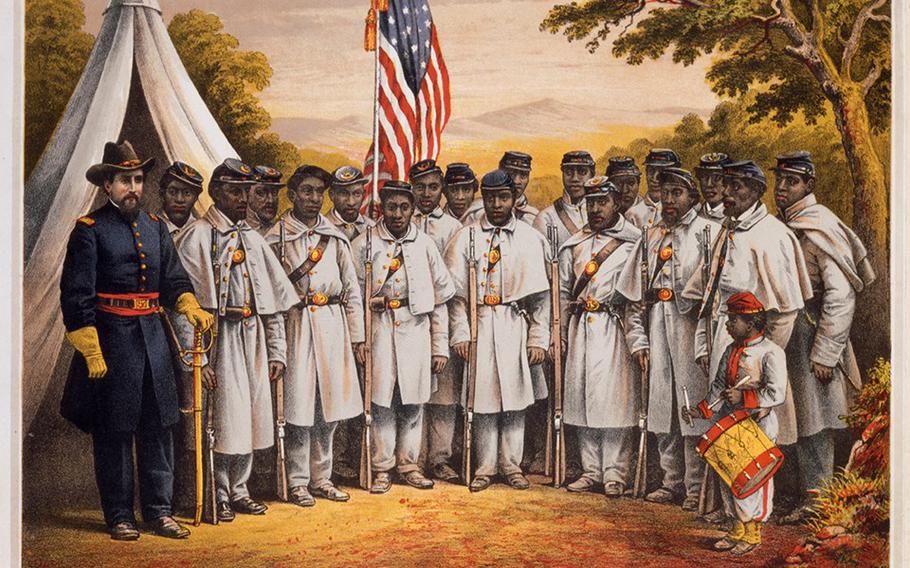
Black troops in Pennsylvania during the Civil War. (Library Company of Philadelphia)
It's when Maurice Imhoff dons his vintage Union Army soldier uniform that he feels most connected to history. With his navy blue wool jacket, a wooden rifle with a bayonet fixed into the muzzle, and a gold eagle breastplate across his chest, he represents an often forgotten group of soldiers — the United States Colored Troops.
"These men, once they got the opportunity, they stood up and took the call to action," Imhoff said. "They picked up the rifle, picked up the flag, and they led the way towards freedom and to free others."
Though Civil War reenactors are most often thought of as older men, Imhoff, 19, is a high school senior who graduates in June. He is a member of the 102nd U.S. Colored Troops Company C, a reenactment group in Jackson, Michigan composed of mostly high school students.
They honor Michigan's only regiment in the colored troops, which was comprised of nearly 1,000 Black soldiers from Detroit, including men who were born in slave states. The original 102nd engaged with Confederate forces numerous times in the Deep South.
As the nation marks Memorial Day and pays tribute to those who died during military service, some also remember the Black soldiers who fought on the Union side during the Civil War. Undeterred by racism, thousands of Black soldiers answered President Abraham Lincoln's call to fight for the United States and their freedom.
When the Civil War began in 1861, Black men throughout the free states were eager to volunteer, but federal law prohibited them from serving in the Army, said Kelly Mezurek, a history professor at Walsh University in North Canton, Ohio. Mezurek is a leading expert on African American service in the Civil War.
It wasn't until Lincoln signed the Emancipation Proclamation on Jan. 1, 1863, that Black men could participate in combat. This federal legislation freed slaves living in Confederate states and permitted African Americans to fight in the United States military.
Ulysses Grant, the Union's commanding general, wrote a letter to Lincoln expressing his support of African American troops. He and Lincoln understood that liberating Black people from slavery gave the Union an advantage on the battlefield.
"By arming the negro we have added a powerful ally," Grant wrote to Lincoln in August 1863. "They will make good soldiers and taking them from the enemy weaken him in the same proportion they strengthen us."
But even after federal law allowed African Americans to fight in the war, there were still white citizens who were displeased with their participation. To make the transition more palatable, Lincoln established segregated regiments with white officers overseeing the Black units.
In May 1863, four months after Lincoln signed the Emancipation Proclamation, the War Department created the Bureau of Colored Troops, which established more than 100 African American regiments.
Even after they were accepted into the Army, Black soldiers still had to prove their valor on the battlefield to win the respect of white America, said Joseph Glatthaar, a professor at the University of North Carolina who specializes in American military history.
The colored troops played critical roles in pivotal battles, including at New Market Heights, where 14 soldiers in the colored troops were awarded Medals of Honor; and the Battle of Appomattox, also in Virginia, which effectively ended the Civil War.
"We saw courage and determination in their coal-black faces," Army Captain Luman H. Tenney, who fought alongside the colored troops at Appomattox, wrote in his April 1965 diary entry. He believed the Black men deserved the right to vote because of their service. "Give them the ballot, for they [ensured] victory that day."
And the value of the colored troops extended beyond their gallantry on the battlefield. Many of the Black regiments also protected wagon trains, railroad cars and prisoners of war, Mezurek said.
"The contribution of these men is so significant that if we only look at what battles did they turn the tide of, we miss everything," she said. "The contributions were they showed up, they were there, and they did their job, and they did it well for the United States of America. We need to do better at recognizing why we have this country today is partly because of those men."
By the end of the Civil War, there were almost 200,000 colored troops, roughly 10% of the Union Army.
After the Civil War, Lincoln acknowledged the significant role the colored troops had in securing a Union victory. "Without the military help of the black freedmen, the war against the south could not have been won," he said.
Reenactors work to preserve those soldiers' legacies, said Algernon Ward Jr., the President of the 6th Regiment United States Colored Troops Reenactors New Jersey. With reenactments stalled due to the pandemic, the group still travels to schools to talk about the colored troops and recently participated in a flag placement ceremony to honor the buried colored troops in New Jersey.
Ward worries that there aren't many young people interested in the history of the colored troops. But the Michigan high school group does more than don uniforms for re-created battle scenes. The students recently raised $3,200 for a highway sign in Detroit honoring the original 102nd regiment.
"If it wasn't for us reenactors, who would be around to commemorate them?" Ward said. "We need the next generation to keep their memories alive."
(c)2021 USA Today
Visit USA Today at www.usatoday.com
Distributed by Tribune Content Agency, LLC.